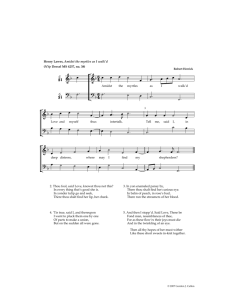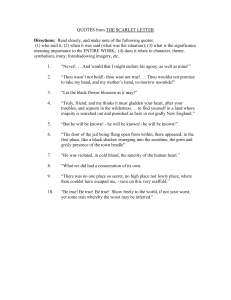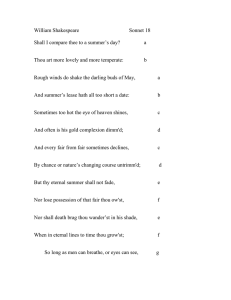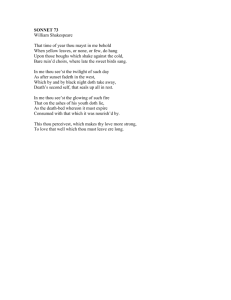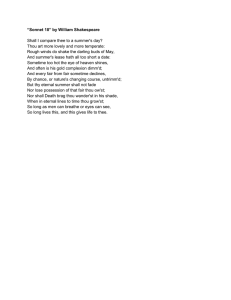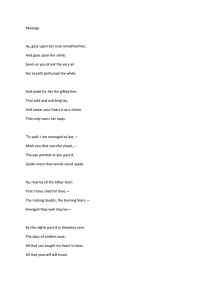F1123.D: Introduction to Literary Study: British Literature Summer 2000 H. Blurton
advertisement
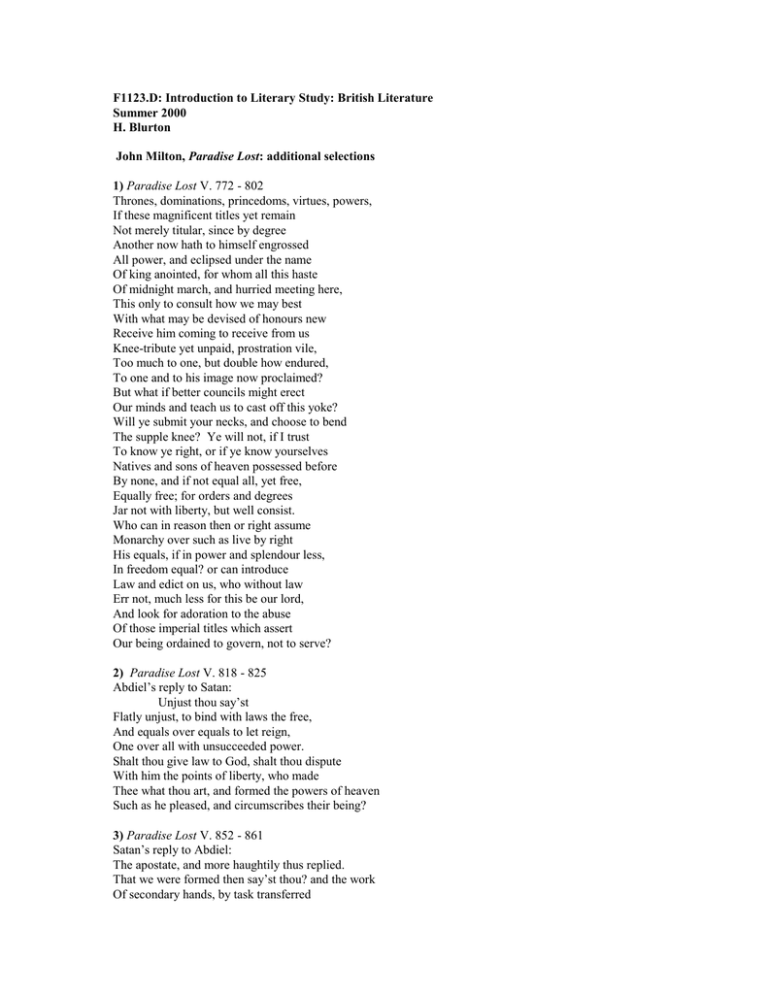
F1123.D: Introduction to Literary Study: British Literature Summer 2000 H. Blurton John Milton, Paradise Lost: additional selections 1) Paradise Lost V. 772 - 802 Thrones, dominations, princedoms, virtues, powers, If these magnificent titles yet remain Not merely titular, since by degree Another now hath to himself engrossed All power, and eclipsed under the name Of king anointed, for whom all this haste Of midnight march, and hurried meeting here, This only to consult how we may best With what may be devised of honours new Receive him coming to receive from us Knee-tribute yet unpaid, prostration vile, Too much to one, but double how endured, To one and to his image now proclaimed? But what if better councils might erect Our minds and teach us to cast off this yoke? Will ye submit your necks, and choose to bend The supple knee? Ye will not, if I trust To know ye right, or if ye know yourselves Natives and sons of heaven possessed before By none, and if not equal all, yet free, Equally free; for orders and degrees Jar not with liberty, but well consist. Who can in reason then or right assume Monarchy over such as live by right His equals, if in power and splendour less, In freedom equal? or can introduce Law and edict on us, who without law Err not, much less for this be our lord, And look for adoration to the abuse Of those imperial titles which assert Our being ordained to govern, not to serve? 2) Paradise Lost V. 818 - 825 Abdiel’s reply to Satan: Unjust thou say’st Flatly unjust, to bind with laws the free, And equals over equals to let reign, One over all with unsucceeded power. Shalt thou give law to God, shalt thou dispute With him the points of liberty, who made Thee what thou art, and formed the powers of heaven Such as he pleased, and circumscribes their being? 3) Paradise Lost V. 852 - 861 Satan’s reply to Abdiel: The apostate, and more haughtily thus replied. That we were formed then say’st thou? and the work Of secondary hands, by task transferred From Father to his son? strange point and new! Doctrine which we would know whence learned: who saw When this creation was? rememb’rest thou Thy making, while the maker gave thee being? We know no time when we were not as now; Know none before us, self-begot, self-raised By our own quickening power 4) from The Tenure of Kings and Magistrates (1649) No man who know aught can be so stupid to deny that all men naturally were born free, being the image and resemblance of God himself, and were, by privilege above all the creatures, born to command and not to obey, and that they lived so -- till from the root of Adam’s transgression falling amongst themselves to do wrong and violence, and foreseeing that such courses must needs tend to the destruction of them all, they agreed by common league to bind each other from mutual injury and jointly to defend themselves against any that gave disturbance or opposition to such agreement. Hence came cities, towns and commonwealths. And because no faith in all was found sufficiently binding, they saw it needful to ordain some authority that might restrain by force and punishment what was violated against peace and common right. This authority and power of self-defense and preservation being originally and naturally in every one of them, and unitedly in them all, for ease, and order, and lest each man should be his own partial judge, they communicated and derived either to one whom for the eminence of his wisdom and integrity they chose above the rest, or to more than one, whom they thought of equal deserving: the first was called a king; the other, magistrates: not to be their lords and masters (though afterward those names in some places were given voluntarily to such as have been authors of inestimable good to the people) but to be their deputies and commissioners, to execute, by virtue of their entrusted power, that justice which else every man by the bond of nature and of covenant must have executed for himself and for one another. And to him that should bear authority and jurisdiction over another, no other end or reason can be imaginable. ... While as the magistrate was wet above the people, so the law was set above the magistrate. When this would not serve, but that the law was either not executed, or misapplied, they were constrained from that time, the only remedy left them, to put conditions and take oaths from all kings and magistrates at their first instalment to do impartial justice by law: who, upon those terms and no other, received allegiance from the people, that is to say, bond or covenant to obey them in execution of those laws which they, the people, had themselves made or assented to. And this ofttimes with express warning, that is the king or magistrate proved unfaithful to his trust, the people would be disengaged. 5) Paradise Lost II. 1 - 10 High on a throne of royal estate, which far Outshone the wealth of Ormuz and of Ind, Or where the gorgeous East with richest hand Showers on her kings barbaric pearl and gold, Satan exalted sat, by merit raised to that bad eminence; and from despair Thus high uplifted beyond hope, aspires Beyond thus high, insatiate to pursue Vain war with heaven, and by success untaught His proud imaginations thus displayed.

